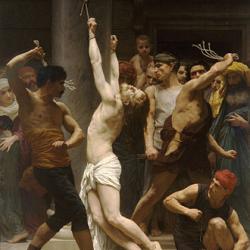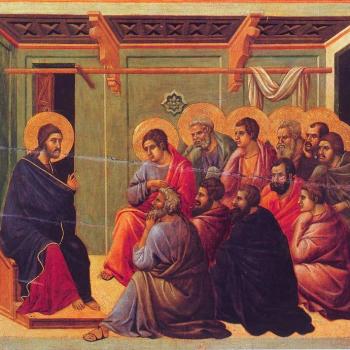Companions on the Journey
Lent Week 6
Monday March 22, 2021
The widow who threw two small coins in the Temple collection heard and responded to the demand of God for all she had. She was, perhaps, strengthened in faith because she knew that long ago God, through Elijah, had fed the widow of Zarephath and her son. She had faith that God would “give food to the hungry” and “sustain the widow”—faith that was stronger than her own bitter experience, which probably told her that the poor and marginalized often went hungry while their “betters” ate their fill. And in faith she said yes to God.
–David Cruz-Uribe Thirty-Second Sunday in Ordinary Time: The Widow’s Mite (November 8, 2015) Vox Nova

Tuesday March 23, 2021
Jesus is still in need in the neediest of his brothers and sisters. He tells us that he is still hungry, thirsty, naked, homeless, sick, and in prison in his disciples. He suffered these things in his own lifetime on earth and continues to suffer them through the members of his Mystical Body. We need to reach out to alleviate the needs Jesus is still experiencing by ministering to his least brothers and sisters. Not only do they depend on us to relieve their needs of hunger and thirst and the like, but we depend on them for opportunities to serve. Without such opportunities, our lives would be the poorer spiritually.
Fr. Andrew Apostoli, What to Do When Jesus is Hungry (2011) Ignatius Press
Wednesday March 24, 2021
What we fear about the poor is what we fear about God: How much of my time will this person want? (I’ve got somewhere to go!) What will this person ask me to do for them? What does this person want me to give them of mine? -Fr. John Hollowell @frjohnhollowell (28 Dec 2018)

Thursday March 25, 2021
The Good Samaritan is not a story about faith – in fact, the religious folk come off badly in the story – but empathy across boundaries. Knowing that everyone – however objectionable their behaviour, or pitiful their demeanour – is a child of a loving God helps me, at least, turn towards, rather than away from, people in need. My own Catholic tradition is full of heroes who reach out over the boundaries of social prejudice and disgust, from Peter Claver tending suppurating lepers to Mother Teresa, whose mission was to bring dignity to the dying whom others recoiled from touching.-Austen Ivereigh, Religious faith builds a civil society in a way secularism does not (Sep 29, 2011) theguardian.com
Friday March 26, 2021
Sister Nirmala, Mother Teresa’s immediate successor, is quoted as saying, “Her heart was big like the Heart of God Himself, filled with love, affection, compassion, and mercy. Rich and poor, young and old, strong and weak, learned and ignorant, saints and sinners of all nations, cultures and religions found a loving home in her heart, because in each of them she saw the face of her Beloved – Jesus.”
One of the reasons that Mother Teresa endeared herself to so many people was that she wasn’t afraid to get her hands dirty when it came to getting work done.
Tony Rossi, Mother Teresa’s “Heart Was Big Like the Heart of God Himself” (September 1, 2016) Christopher Closeup

Saturday March 27, 2021
Please pray for ending abortion, child abuse, adultery, molestation, rape, family abandonment, tribal warfare, euthanasia, assisted suicide, human trafficking, death penalty, racism, domestic violence, addiction, poverty, sexism, bullying, national shaming, pornography, ethnic cleansing, broken families, war, political correctness, deceitful politicans, national prejudice, religious persecution, racial tensions, terrorism, clericism, government-imposed famine and rampant materialism!
–Joseph Clement Buccilli September 4, 2018

Sunday March 28, 2021
Sixth Sunday of Lent
As soon as morning came,
the chief priests with the elders and the scribes,
that is, the whole Sanhedrin held a council.
They bound Jesus, led him away, and handed him over to Pilate.
Pilate questioned him,
“Are you the king of the Jews?”
He said to him in reply, “You say so.”
The chief priests accused him of many things.
Again Pilate questioned him,
“Have you no answer?
See how many things they accuse you of.”
Jesus gave him no further answer, so that Pilate was amazed.
Now on the occasion of the feast he used to release to them
one prisoner whom they requested.
A man called Barabbas was then in prison
along with the rebels who had committed murder in a rebellion.
The crowd came forward and began to ask him
to do for them as he was accustomed.
Pilate answered,
“Do you want me to release to you the king of the Jews?”
For he knew that it was out of envy
that the chief priests had handed him over.
But the chief priests stirred up the crowd
to have him release Barabbas for them instead.
Pilate again said to them in reply,
“Then what do you want me to do
with the man you call the king of the Jews?”
They shouted again, “Crucify him.”
Pilate said to them, “Why? What evil has he done?”
They only shouted the louder, “Crucify him.”
So Pilate, wishing to satisfy the crowd,
released Barabbas to them and, after he had Jesus scourged,
handed him over to be crucified.
The soldiers led him away inside the palace,
that is, the praetorium, and assembled the whole cohort.
They clothed him in purple and,
weaving a crown of thorns, placed it on him.
They began to salute him with, “Hail, King of the Jews!”
and kept striking his head with a reed and spitting upon him.
They knelt before him in homage.
And when they had mocked him,
they stripped him of the purple cloak,
dressed him in his own clothes,
and led him out to crucify him.
They pressed into service a passer-by, Simon,
a Cyrenian, who was coming in from the country,
the father of Alexander and Rufus,
to carry his cross.
They brought him to the place of Golgotha
—which is translated Place of the Skull —
They gave him wine drugged with myrrh,
but he did not take it.
Then they crucified him and divided his garments
by casting lots for them to see what each should take.
It was nine o’clock in the morning when they crucified him.
The inscription of the charge against him read,
“The King of the Jews.”
With him they crucified two revolutionaries,
one on his right and one on his left.
Those passing by reviled him,
shaking their heads and saying,
“Aha! You who would destroy the temple
and rebuild it in three days,
save yourself by coming down from the cross.”
Likewise the chief priests, with the scribes,
mocked him among themselves and said,
“He saved others; he cannot save himself.
Let the Christ, the King of Israel,
come down now from the cross
that we may see and believe.”
Those who were crucified with him also kept abusing him.
At noon darkness came over the whole land
until three in the afternoon.
And at three o’clock Jesus cried out in a loud voice,
“Eloi, Eloi, lema sabachthani?”
which is translated,
“My God, my God, why have you forsaken me?”
Some of the bystanders who heard it said,
“Look, he is calling Elijah.”
One of them ran, soaked a sponge with wine, put it on a reed
and gave it to him to drink saying,
“Wait, let us see if Elijah comes to take him down.”
Jesus gave a loud cry and breathed his last.
Here all kneel and pause for a short time.
The veil of the sanctuary was torn in two from top to bottom.
When the centurion who stood facing him
saw how he breathed his last he said,
“Truly this man was the Son of God!”
Palm Sunday of the Lord’s Passion | USCCB

Check Out previous Weeks
Companions on the Journey: Lenten Meditations Week 1
Companions on the Journey: Lenten Meditations Week 2
Companions on the Journey: Lenten Meditations Week 3

















